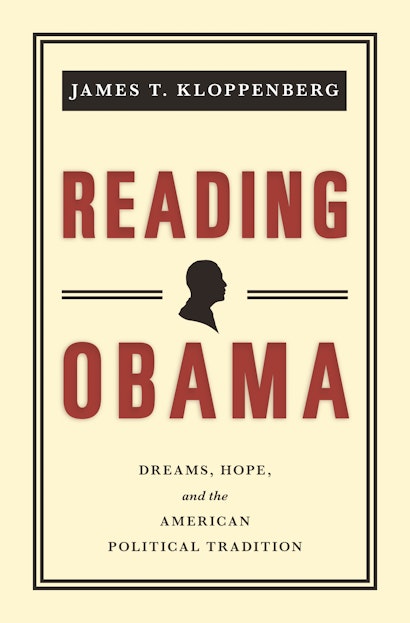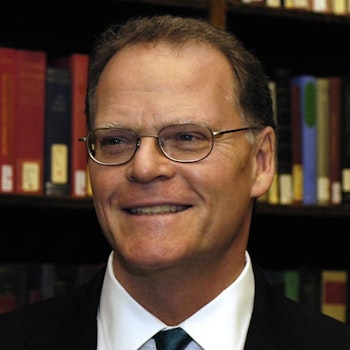Derided by the Right as dangerous and by the Left as spineless, Barack Obama puzzles observers. In Reading Obama, James T. Kloppenberg reveals the sources of Obama’s ideas and explains why his principled aversion to absolutes does not fit contemporary partisan categories. Obama’s commitments to deliberation and experimentation derive from sustained engagement with American democratic thought. In a new preface, Kloppenberg explains why Obama has stuck with his commitment to compromise in the first three years of his presidency, despite the criticism it has provoked.
Reading Obama traces the origins of his ideas and establishes him as the most penetrating political thinker elected to the presidency in the past century. Kloppenberg demonstrates the influences that have shaped Obama’s distinctive worldview, including Nietzsche and Niebuhr, Ellison and Rawls, and recent theorists engaged in debates about feminism, critical race theory, and cultural norms. Examining Obama’s views on the Constitution, slavery and the Civil War, the New Deal, and the civil rights movement, Kloppenberg shows Obama’s sophisticated understanding of American history. Obama’s interest in compromise, reasoned public debate, and the patient nurturing of civility is a sign of strength, not weakness, Kloppenberg argues. He locates its roots in Madison, Lincoln, and especially in the philosophical pragmatism of William James and John Dewey, which nourished generations of American progressives, black and white, female and male, through much of the twentieth century, albeit with mixed results.
Reading Obama reveals the sources of Obama’s commitment to democratic deliberation: the books he has read, the visionaries who have inspired him, the social movements and personal struggles that have shaped his thinking. Kloppenberg shows that Obama’s positions on social justice, religion, race, family, and America’s role in the world do not stem from a desire to please everyone but from deeply rooted—although currently unfashionable—convictions about how a democracy must deal with difference and conflict.
Awards and Recognition
- A National Public Radio (npr.org/blogs) Mara Liasson Best Book of the Year for 2010
"James Kloppenberg, one of America's foremost intellectual historians, persuasively argues that [there is] a broader shift in American philosophy away from appeal to general principles, valid at all times and in all places, toward a reliance on local, historically particular values and ideals. Kloppenberg's own endeavor, in surveying the work in political and legal theory that seems to have shaped President Obama's thinking, is to argue for the coherence, the Americanness, and the plausibility of Obama's approach to politics and to the Constitution."—Kwame Anthony Appiah, New York Review of Books
"Kloppenberg's brief intellectual biography of Mr. Obama provides an excellent portrait of the shining self-image of the progressive intellectual."—Peter Berkowitz, Wall Street Journal
"A welcome addition. . . . With his breadth of knowledge and his simplicity of prose, Kloppenberg is a fine guide."—David Greenberg, New Republic
"Reading Obama offers a fascinating view of the man Kloppenberg calls 'the most penetrating political thinker elected to the presidency in the past century.'"—Newark Star-Ledger
"One of Kloppenberg's most important claims is that Obama embodies the spirit of pragmatism—not the colloquial pragmatism that is more or less the same thing as practicality, but the philosophical pragmatism that emerged largely from William James and John Dewey and continued to flourish through the work of Richard Rorty, Hilary Putnam, and others. Kloppenberg provides an excellent summary of the pragmatic tradition—a tradition rooted in the belief that there are no eternal truths, that all ideas and convictions must meet the test of usefulness. . . . Kloppenberg is best when he analyzes Obama's own writing—Dreams from My Father, The Audacity of Hope, and some of his memorable speeches. He gives an excellent analysis of Obama's views of Lincoln and of the ways in which he has come to terms with race."—Alan Brinkley, Democracy
"The case Kloppenberg makes is persuasive and, for anyone interested in the larger context of Obama's thinking, he demonstrates that this serious man is a rarity."—Bruce Elder, Sydney Morning Herald
"A fascinating book."—Alan Dobson, LSE Politics and Policy blog
"[An] excellent book . . . Kloppenberg offers a broad and deep interpretation of the education of Obama."—Anglican Theological Review
"Jim Kloppenberg, one of the country's finest intellectual historians, has come up with a remarkable idea as to how we can understand President Obama: just read what he has written and take it seriously. Think of Kloppenberg as the Bob Woodward of investigative philosophical analysis. He's written a fine and hugely informative book."—E.J. Dionne, syndicated columnist and author of Souled Out
"An intellectual biography of a practicing politician might nowadays seem a contradiction in terms, but James Kloppenberg, one of America's leading intellectual historians, draws penetrating insights from a close examination of the ideas that animate Barack Obama. Reading Obama shows the powerful impact on Obama's politics of his engagement with the late twentieth century revival of philosophical pragmatism and civic republicanism. Obama takes ideas seriously, and Kloppenberg details why that matters for all of us. This is a fine example of contemporary intellectual history."—Robert D. Putnam, Harvard University
"Obama is not just a powerful speaker, but a thinker engaged with the ideas of his country and his age—this argument by historian James Kloppenberg should therefore fascinate anyone interested in American politics or how ideas shape public life. Tracing the influences of Obama's family, educational, and work experiences on his ideas, Reading Obama locates a unique individual in the crosscurrents of American democracy and continuing fights over American ideals."—Martha Minow, Harvard Law School
"Reading Obama strikingly illuminates the man, enriching our sense of his intellectual formation and commitments and significantly deepening our understanding of his place in history. In the face of the hyper-partisan atmosphere of the moment, this book reminds readers of the enduring force of an alternative tradition in the American past, and sketches that tradition with care and persuasion."—Daniel T. Rodgers, Princeton University
"In this arresting, highly informative book, Kloppenberg shows how Obama was shaped by the intellectual debates of the 1980s and is thus the first president since Woodrow Wilson to deeply absorb and act upon the most sophisticated social theories of his generation."—David Hollinger, University of California, Berkeley


